ROS1 rearrangements occur in approximately 1% of patients with NSCLC
The Promising Therapeutic Strategy against ALKoma and ROS1-positive Tumors
It has recently been identified that crizotinib significantly inhibits the tumor cells with ALK-fusion genes or ROS1-rearranged driver genes which encode constitutive tyrosine kinase receptors. The emerging concept of lung cancer stem cells (CSCs) arises a question of the relationship between CSCs and ROS1 gene rearrangement.
Lung non-small cell cancers are likely to develop due to the fusion genes characterized by EML4-ALK, which suggests the importance of fusion genes in tumorigenesis in the same way as chronic myeloid leukemia (CML) with Philadelphia chromosome derived from t(9;22).
On the other hand, EGFR signal pathway is hyper-activated in lung cancer cells or head and neck squamous cancers. EGFR and CD44 variant (CD44v) expression shows the inverse pattern, and furthermore, CD44v-positive CSCs are refractory to reactive oxygen species (ROS)-induced cellular senescence and apoptosis. It remains to be known the way crizonitib relatively inhibits which sub-population of tumor cells.”
Content Source: Originally posted in “Cancer Targets & Therapeutics Society” LinkedIn group by Jean Plante
Citation: http://www.nejm.org/doi/full/10.1056/NEJMoa1406766

Recent Comments